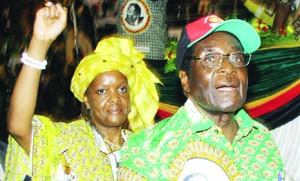The barren narrative of a Zanu-PF split

Qhubani Moyo
There is an interesting narrative that seems to be taking a centre stage within certain circles of public discourse about the future of Zanu-PF as the ruling party as well as the future of the country. The discourse which has been embraced by some religiously as the gospel truth is that the current discord in the party of government is likely to lead to a split. The narrative, which emanates from the current desperate manoeuvres by former secretary for administration Didymus Mutasa and his gang to destabilise the party of government and thus disturb state operations in a way that causes national instability, is a subject that some people especially in the opposition circles seem to want to believe and celebrate.
My view on the subject manner is that the thinking and this discourse is misplaced and represents more of a wish list by disgruntled people who have given up on fighting Zanu-PF and are now resorting to wild imaginary predictions to suit their own imaginations.
The basis of my argument is that whenever there are disagreements and discord within ruling political parties such differences cannot lead to a split or fractures of the party a short time after a major election that the ruling party would have won resoundingly.
Zanu-PF won a resounding two thirds majority in the July 2013 elections and its Presidential candidate President Mugabe got a thunderous 61 percent in an election where many had counted him out. The resounding success actually shocked many including some within his party who had written him off and had started to make coalition and networks with the opposition in preparation for the post-Mugabe era which they thought had come.
The same grouping still working in cahoots with the elements which have always wanted to effect illegal regime change in the country and create a satellite state to safeguard the interests of imperialist forces in sub-Saharan Africa have not stopped with the successful running of the 6th Zanu-PF Congress but have gone a gear up.
Having failed in their strategy to dislodge President Mugabe through an ambush at the congress, the same gang having regrouped and weighed its options of delegitimising the congress through frivolous court applications as a precursor to launching a political party which they can then cross-fertilise with the perennial agents of regime change to push out Zanu-PF. What is in the clear picture is that those manoeuvres like the other ones before will naturally fail yet it cannot escape without scrutiny. The narrative of the split, which in my view is unproductive and have no signs of fertility, represents barrenness which can never be productive.
There is no history the world over of ruling political parties splitting immediately after a successful electoral victory. Ruling political parties that win the elections like Zanu-PF did in 2013 actually consolidate their power because of the opportunities that come with being in charge of government and the state. It is only political parties that lose elections that are prone to split.
In the recent years in Zimbabwe there is documented evidence of many such splits with the latest being that of the MDC-T which has seen them create two fragments because of loss of power in the 2013 elections. Ruling political parties actually consolidate themselves when they win and part of the consolidation process involves internal stock-take to reorganise, reenergise and reconfigure the architectural construction in line with the new mandate and service policy implementation requirements.
The ruling political party that wins elections finds itself stuck together as a result of the new mandate. However, this does not mean that there is no discord within the organisations; this discord comes out especially during major internal election processes like congresses.
This is normal in ruling political parties but it does not lead to significant fragmentation because the losing side will always throw some punches but these will not be significant enough to break the party into pieces.
But the only problem is that the current crusade led by Mutasa is not just involving disgruntled party supporters but a gang well versed in security matters of the state and working in cahoots with blood thirsty owners of international capital who have always wanted to destabilise the country. This makes the group a very dangerous lot in that while they might not succeed in splitting the party they have the capacity to cause instability that will warrant responses from the state defence mechanisms to protect citizens and in so doing becoming the entry point for the agents of imperialism who have always wanted to effect illegal regime change in the country.
Ruling political parties usually split on the eve of an election and abundant evidence exists in support of this claim. The splits on the eve of the elections is usually caused by differences in which candidate should represent the party in the elections. The construction of Zanu-PF insulates it from such kind of fissures because its internal leadership selection process happens way before the major national elections.
Zanu-PF elects its leadership a year after the presidential elections. This means that it goes to its congress with a president who has just been handed a five-year mandate in charge of the state. Such a person becomes a very strong and powerful figure in party politics and thus able to command adequate support from the party structures. Party structures would normally not go against the person who has state power because of their command and control.
Should need be, the person by virtue of being commander in chief of the defence forces can use the security apparatus to protect the party from party vultures who want to clandestinely usurp state power by manipulating party systems and thus grabbing it for personal gain.
By having the state apparatus at his disposal and by using it to protect the ruling party from degeneration into chaos, the State President will actually be protecting the citizens because fissures in the party of government can have dire consequences for the state as well as peace and security of citizens. It should also be understood that the Zimbabwean elections allow for the party to run and get its seats in parliament and also allow for the President to run his own race and get his own votes.
Our situation is not like the South African one where the voters vote for the party and then the party forwards a candidate that is voted for by parliament. While there could be technical arguments that it is the parliament that chooses the president the reality is that it is the party that uses its majority in parliament to capture the State Presidency. In the South African situation it thus becomes easy for the ruling party to recall the State President as he gets his mandate on the strength of the party votes.
But in the Zimbabwean situation the President runs in his own race and gets his own votes. Theoretically speaking it is possible to have a president losing but the party winning or vice versa. Actually in the 2008 elections when the Mujuru cabal influenced the bhora musango campaign, the party got more votes than the President; however in the 2013 elections President Mugabe got sufficient votes to land the State Presidency and also marshalled the party to a two thirds majority in parliament by being the chief striker in the bhora mugedhi campaign.
What this means is that after his swearing in as the State President in 2013, President Mugabe entered into a new five-year term as State President but the last year of his five-year term as the Zanu-PF President. Here is the quandary, on finishing his term as party president in 2014 he still had four more years to go in his State Presidency because the term expires in 2018.
Again realistically speaking it is possible to have a Party President who is different from the State President and thus create two conflicting centres of power unless it is by arrangement. In realisation of this quandary and consistent with the agenda of keeping the party intact Zanu-PF has always found it worthwhile to safeguard the mandate of the State President by giving him another term at the helm of the party. This is where the difficulties arise in that with his power as State President it would always be difficult to use any machination to push him off the party presidency because of the power he wields. While there could be disgruntlement that might come out of the congress like it is always the case with all malcontents, these will ultimately subside with time as the protagonists are persuaded through different forms of engagement including use of security apparatus if it is clear that their machinations pose a clear threat to national security.
Effectively, the Zanu-PF constitution is well constructed to protect the State Presidency from being weakened by party problems. I am sure arguments can be raised on the issue of use of security organs to protect the state presidency against party machinations as being abuse of power. But that cannot be taken seriously as the State Presidency is supreme to party presidency.
While one runs the presidency on the sponsorship of the party ticket, in taking the oath of office they take it for allegiance to the national constitution and not party. This however is not to say the party is not important but to say in the hierarchy of importance of the political matrix the party presidency is subservient to the State constitution even though the party in power drives policy for implementation by the government.
Equally while it is known that security organs are in the discipline of the state and cannot be seen to be delving in internal party politics because the ruling party commands the guns and not the gun commanding the party, once the State President is installed, he or she becomes the commander-in-chief of the defence forces and therefore becomes subject to protection from all threats that can destabilise his role and that includes even the party.
This is the reason why President Mugabe wields so much power in going to congress and that is why it was difficult for those plotting against him to succeed because there were other bigger forces that were watching them and worked ready to thwart those machinations.
Those who are working on destabilising the party will obviously not succeed because the forces that protect the state and the commander-in-chief against any form of destabilisation can be called to action in the interest of protection of national security.
There are clear indications so far that the narrative of splitting the party is not just a political narrative but a clear issue of attempts to destabilise a serving State President. Already it looks like some of the people that Mutasa wanted to hoodwink into being part of the rebellion have come out against the move and disassociated themselves from his utterances.
This is a clear sign that he speaks for himself and in his imaginary world he has become delusionary and sees many people following where there are none. In the end the narrative of a Zanu-PF split will not produce the results that some wish for, it will just but remain a dry, unproductive barren narrative. It will just remain a wishful thought that will not see the light of day.
Dr Qhubani Moyo is a policy and political analyst from Bulawayo East Constituency, he is contactable on [email protected]










Comments